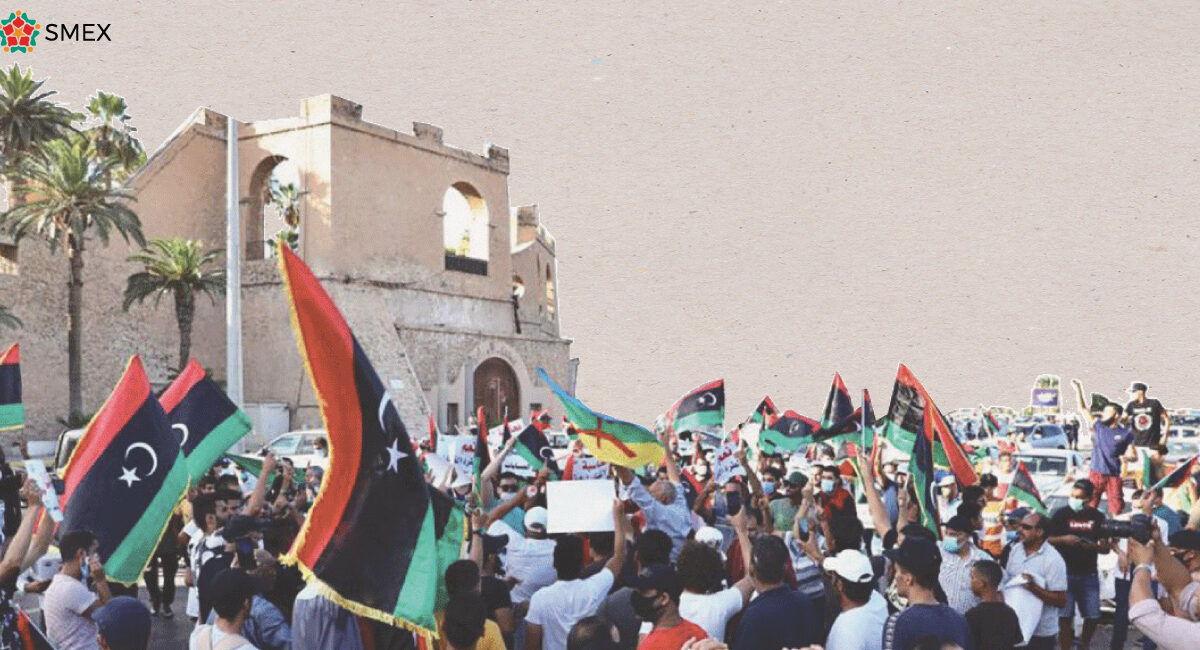In recent years, Libya has experienced recurring waves of attacks and criticisms targeting social media platforms. Some have framed their discourse around the threat social media poses to “Libyan societal values and public morality,” calling for banning TikTok and the prosecution of users.
These attempts are part of a larger plan to maintain a unified discourse and suppress non-conforming online voices who share content deemed incompatible with “Libyan cultural norms.” The latest episode in this series is the Cybercrime Law No. 5 of 2022, which empowers authorities to violate human rights and privacy principles under the guise of preserving societal decency and security.
Among the adverse implications of Libya’s division into two administrative and military factions in 2011 is the erosion of legislative structures. The subsequent overlooking—or rather neglect— of events, laws, and violations that threaten human rights has been unfortunate. The Libyan crisis deepened as two rival governments emerged: the internationally recognized government of Fayez Al-Sarraj, headquartered in Tripoli, and the government of Abdullah Al-Thani, based in Tobruk and backed by Libyan National Army commander Khalifa Haftar.
Calls for a Ban on TikTok
In May 2022, the “Civil Society Commission in Tripoli,” which according to its mission statement aims to “emphasize the role of civil society organizations, enhance their performance and support their independence in achieving their goals,” called on the Libyan Ministry of Communications to ban TikTok. The Commission claimed that the app promotes “moral decay and bad behavior within the community,” it also has a “negative impact on the morals, culture, and conservative society of Libya.”
In a tweet posted on his Twitter account in February 2023, the head of the National Commission for Human Rights in Libya (NCHRL), Ahmed Hamza, stated that “banning and blocking TikTok in Libya has become a national and societal necessity to preserve public order and morals, and the social, national, and religious values of Libyan society. It is also necessary in order to protect the rights and freedoms of citizens, especially the right to privacy, given the harm that this application can cause to public morals.”
To make its demand more serious and official, the NCHRL sent a tense letter, with loose and vague language, to the Attorney General demanding a ban on the Chinese application. The NCHRL, which is supposed to be safeguarding and advocating for human rights, invoked Law No. 5 of 2022 on combating cybercrime that could threaten basic freedoms.
The calls to ban TikTok have sparked outrage among activists and bloggers who viewed it as “an attempt to impose restrictions on social media users and limit their freedom to express their opinions or make choices about their behavior and attire.”
The demands to ban the application continued over the past months and turned into a public opinion matter, so much so that rumors and false news spread that TikTok had actually been banned in the country. Although no official decision was issued to ban TikTok, official entities adopted the demands, including the office of the General Authority for Communications and Informatics. It addressed a letter to the head of the General Authority of Islamic Affairs and Endowments’ office, asking to “prepare a comprehensive sermon that explains the danger of malicious websites and applications to be disseminated and read in mosques.”
Law Against Cybercrime
On October 26, 2021, the Libyan House of Representatives passed a decision to issue a Law against Cybercrimes on September 27, 2022, without prior notice and in complete disregard of previous demands by civil society organizations and four United Nations’ special rapporteurs to withdraw the Law and not implement it.
The UN experts commented on the draft law in March 2022, stating that it “could have a serious impact on the right to freedom of opinion and expression and the right to privacy.”
The Libyan House of Representatives, located in eastern Libya (Benghazi), did not consult with any civil society groups, technology experts, or cybercrime experts. According to Human Rights Watch, the main shortcomings of the Libyan law to combat cybercrimes include “vague and loose definitions that could lead to legal prosecution for peaceful expression, punishable by imprisonment for up to 15 years and hefty fines.”
Moreover, the Law grants the National Information Security and Safety Authority broad authority to block websites and monitor digital content in cases of “security or urgent requirements” or when the content in question conflicts with “public morals,” without providing a clear definition of what the term entails. The law also grants authorities the right to monitor electronic messages and conversations between individuals.
Lastly, the Law stipulates that “anyone who spreads rumors or publishes data or information that threatens the public security and safety of the country or any other country through the internet, on any other electronic means in Libya or any other country, faces a long prison sentence.”
Delegitimizing Civil Society in Libya
On March 8 last year, the Libyan Supreme Judicial Council issued a ruling invalidating the legality of civil society organizations formed after 2011, following the overthrow of former Libyan President Muammar Gaddafi (1969-2011), citing that these organizations, numbering more than six thousand, were formed without reference to a law issued by the Libyan House of Representatives.
Consequently, the legal administration announced that “all organizations and associations formed based on regulatory rules issued by the executive authority without relying on any legislative law are considered null and void, and the highest authorities in the state must take necessary measures to dissolve them.”
Based on the above, circular No. (5803) issued by the Director of the Foreign Affairs and International Cooperation Administration at the Prime Minister’s Office for the Government of National Unity on March 13 urged ministries not to deal with civil society institutions and called on relevant departments to revoke the licenses of all non-governmental organizations established since 2011.
Activists and civil society organizations opposed the decision, as 22 organizations issued a joint statement in which they considered the circular to be “the latest episode in a series of attacks on civil society in Libya.” They stated it would “make all civil society organizations illegal, ultimately shutting off the entire civil space in Libya.”
The political division that the country is going through plays a significant role in this chaos, according to digital transformation expert Amjad Bader. He explained to SMEX that “the presence of two governments in Tripoli and Benghazi has led to the division of the legislative and judicial authorities into conflicting bodies, especially since the Constitutional Court has decided not to consider political division cases at all since 2015.”
These developments prompted the “Audit Bureau” in Tripoli, which represents the highest body for financial control and auditing in Libya and is directly affiliated with the legislative authority, to hold a meeting with some civil society organizations on March 21. The two parties agreed to develop a cooperation strategy and establish a communication network in preparation for signing a “memorandum of understanding for joint work,” according to a statement by the Audit Bureau.
The Bureau also stated on its Facebook page that the second meeting was held “in continuation of the first coordination meeting, and to strengthen the cooperative role between the higher supervisory bodies and civil society institutions in the fight against corruption, in accordance with the competences of the Bureau under its reorganization law and the regulatory decisions issued by the Bureau’s presidency regarding communication and engagement strategies with civil society, and what international organizations concerned with the Bureau’s work call for in terms of communicating with stakeholders.”
During the spring of 2022, Libyan authorities arrested a number of teenage civil society activists on charges of atheism and spreading Western ideas. It opened investigations and imposed arbitrary measures to restrict the freedom of individuals and organizations working under the name of civil society, according to Bader.
Similar to what is happening in Egypt, Tunisia, Iraq, and Lebanon, the Libyan reality is just a living and ongoing example of the continued trend of governments in our region to exert their control by restricting freedoms in the digital space in particular, not only in the absence of a political, legislative, and judicial structure capable of setting boundaries for these attempts, but also in clear complicity with them in many cases.
The year 2023 does not seem to be promising when it comes to digital rights in Libya, as well as in other countries in the WANA region. Will the current trajectory continue to deteriorate, or will we see significant developments that alleviate the gravity of this reality?



